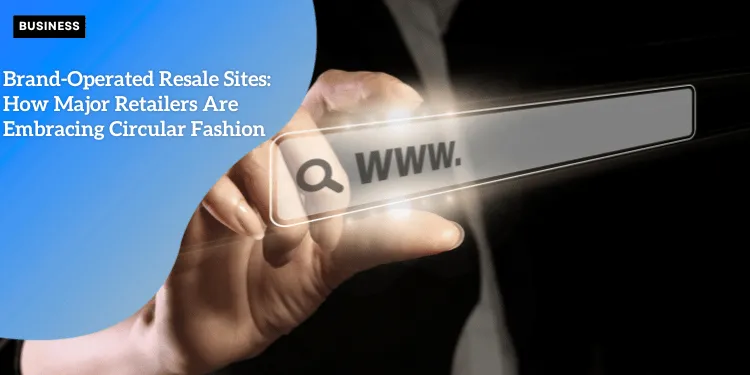Brand-Operated Resale Sites: How Major Retailers Are Embracing Circular Fashion

Anúncios
Growing Environmental Concerns
As environmental awareness continues to rise, many brands are acknowledging the urgent need to shift towards more sustainable practices.
With approximately 300 million pairs of shoes discarded annually in the United States alone, the fashion industry has been placed under scrutiny for its impact on the environment.
This has pushed companies to search for innovative ways to extend the life of their products and reduce waste.
The Need for Sustainable Solutions
The alarming statistics regarding discarded footwear underline a broader problem within the fashion industry: the disposal of millions of apparel items each year.
Anúncios
This practice not only fills landfills but also contributes significantly to carbon emissions and environmental degradation.
As a result, consumers are demanding more sustainable options, prompting brands to explore circular fashion initiatives.
Adopting a circular approach—where products are reused, recycled, and recirculated—can substantially diminish the environmental footprint of the fashion sector.
Anúncios
 Brand-Operated Resale Sites
Brand-Operated Resale Sites
Brands Adopting Resale Platforms
More and more companies are launching dedicated resale platforms as part of their broader sustainability strategies.
These initiatives are designed to recirculate products, effectively reducing waste and encouraging consumers to consider second-hand options.
For instance, American Eagle has introduced the RE/AE resale shop, which allows items to be traded or sold, prolonging their usable life and helping to keep millions of items out of landfills.
Additionally, programs like Patagonia’s Worn Wear and Eileen Fisher’s Renew focus on trade-ins and resale, ensuring items that might otherwise be discarded are cleaned, repaired, and resold.
This not only supports a reduction in environmental impact but also aligns with consumers’ growing interest in sustainable shopping options.
Integrated Sustainability Strategies
| Aspect | Details |
|---|---|
| 🌍 Environmental Impact | Resale platforms are helping brands reduce environmental impact by promoting the reuse and recycling of products. |
| 🔄 Sustainability Programs | Brands are integrating resale platforms into broader sustainability initiatives like repair services, recycling, and eco-friendly material use. |
| 🛍️ Patagonia Example | Patagonia’s Worn Wear program encourages customers to trade in used items for store credit, which are then repaired and resold. |
| 🔜 Next Steps | The next chapter will explore various types of brand-operated resale programs being implemented by different companies. |
Types of Brand Resale Programs
When it comes to sustainability, brands are getting creative by implementing various resale programs.
These initiatives not only promote recycling and reuse, but they also align perfectly with the growing consumer demand for sustainable options.
Here’s a closer look at the different types of brand resale programs transforming the fashion industry.
Trade-in Programs Offering Store Credit
Trade-in programs are becoming increasingly popular, especially among brands committed to sustainability.
This type of resale program allows customers to return their used items in exchange for store credit.
Brands like Eileen Fisher have excelled in this area with their Renew program, which offers customers Renew Rewards for bringing back worn apparel.
Similarly, Lululemon’s Like New provides e-gift cards to customers trading in their pre-loved clothing.
Not only does this help keep clothes out of landfills, but it also incentivizes customers to stay loyal to the brand.
Peer-to-Peer Marketplaces Facilitating Direct Consumer Exchanges
Peer-to-peer marketplaces create a platform for consumers to sell items directly to one another.
An example of this model is Outerknown’s Outerworn.
Outerworn allows users to list and sell their previously owned Outerknown apparel, fostering a community of sustainability-conscious shoppers.
Such marketplaces offer a seamless and engaging way for consumers to recirculate fashion, reducing waste and extending product lifecycles.
White-Glove Sustainability Services for Luxury Goods
For luxury brands, maintaining the high standards associated with their names is crucial, even in the resale market.
White-glove services cater to this need by offering top-tier care for pre-owned products.
Bergdorf Goodman’s program exemplifies this with a comprehensive service that includes editing, repairing, and reselling luxury goods through a partnership with Rebag.
This approach ensures that high-quality items are given the attention they deserve, maintaining their value and appeal while contributing to a circular economy.
As brands continue to explore and expand their resale programs, these efforts are not just a trend but a fundamental shift towards more sustainable business practices.
Brands are setting the stage for innovative and impactful solutions that will shape the future of the fashion industry.
Pioneer Brands in the Resale Space
The evolution of brand resale programs has seen several pioneers establish innovative paths toward sustainability.
Among these, Patagonia, Eileen Fisher, and REI stand out for their early and continuing commitment to circular fashion.
Patagonia’s Worn Wear Program
Patagonia has been a trailblazer in the resale space since launching its Worn Wear program in 2013.
Initially starting as a series of pop-up events, Worn Wear has grown into a comprehensive trade-in and resale system.
Patagonia encourages customers to return their used items in exchange for credit, which can be used for new or secondhand purchases directly from the Worn Wear website or Patagonia retail stores.
The program ensures that quality items are cleaned and resold, while others are recycled or repurposed.
Eileen Fisher’s Renew Program
Eileen Fisher’s Renew program exemplifies the natural evolution from a small-scale initiative to a full-fledged national service.
Launched in 2009 as a way for employees to return old clothes, the program expanded in 2013 to include all customers.
Participants can return their worn Eileen Fisher pieces to any store location in the U.S. in return for Renew Rewards.
The collected items are then cleaned and resold if they are in good condition.
Those beyond repair are upcycled or transformed into art, thus contributing to the company’s zero-waste goals.
REI’s Re/Supply Program
REI has long supported the notion of extending the life of outdoor gear through its famous garage sales.
These informal sales have evolved into the structured Re/Supply program.
Launched in 2017, the program allows co-op members to trade in gently used gear for gift cards, which can then be used towards new or used products.
This formalized approach has helped REI foster a more sustainable shopping experience, reducing waste and promoting the reuse of outdoor equipment.
Through these pioneering resale programs, brands are not merely reducing waste but also modeling sustainable practices for the industry.
This movement towards circular fashion is expected to advance further as more companies recognize the value of keeping their products in circulation.
Technology Partnerships Enabling Resale Success
Role of Resale-as-a-Service Platforms in Powering Brand Marketplaces
To build successful branded resale shops, many retailers are partnering with specialized platforms offering resale-as-a-service (RaaS).
These platforms streamline the resale process, providing the infrastructure for listing, managing, and selling pre-loved items.
Companies like ThredUp and Trobe are leading the way by integrating seamlessly into brand websites, ensuring a smooth user experience and robust backend operations.
This allows brands to focus on their products and customers without being overwhelmed by logistics.
Integration of AI and Digital Tools for Product Listing and Valuation
Artificial Intelligence (AI) and digital tools play a significant role in enhancing the efficiency and scale of branded resale programs.
AI technologies help with the automatic listing and valuation of pre-owned items. For instance, using image recognition, AI can evaluate the condition of an item and determine its resale value accurately.
These tools improve the speed and accuracy of listings while providing consumers with consistent and fair pricing.
Retailers like Patagonia and Lululemon leverage AI to manage their large inventories of trade-ins and streamline the resale process.
Partnerships with Specialized Platforms Like ThredUp and Trobe
The partnerships with platforms such as ThredUp and Trobe are vital for powering successful brand-operated resale websites.
These platforms offer comprehensive solutions that include everything from user account management to secure payment processing.
ThredUp, for instance, partners with various brands to facilitate seamless trade-in programs, making it easy for consumers to send in their used items in exchange for store credit.
Similarly, Trobe powers initiatives like Arc’teryx’s ReGear and Canada Goose’s Generations, helping brands recirculate products efficiently.
As technology continues to evolve, the integration of advanced tools and strategic partnerships will further optimize and expand branded resale platforms.
These advancements are crucial for achieving sustainability goals and reducing overall carbon footprints in the fashion industry.
These tech-enabled services are not just trends but foundational components for future-proofing the retail sector, ensuring both growth and sustainability in the long run.
Impact and Future of Brand Resale
As brand-operated resale platforms gain momentum, their impact is becoming increasingly clear.
Brands like American Eagle have recirculated over 1 million items through their RE/AE shop, highlighting the success of such initiatives.
These figures reflect consumers’ growing willingness to participate in trade-in programs and buy pre-owned products, driven by environmental concerns and the desire for sustainable shopping options.
Success Metrics
Collecting and analyzing data is crucial for the success of resale platforms.
American Eagle’s impressive milestone of recirculating over 1 million items exemplifies how impactful these programs can be.
Such metrics not only demonstrate the positive environmental impact but also help brands tweak and improve their resale strategies to better meet consumer needs.
Expansion Plans and Global Rollout
Brands are not just stopping at local success; there’s a tangible push towards global implementation.
Companies are exploring international markets to extend their sustainability initiatives, adapting to different regional demands.
Ikea’s Preowned marketplace has launched in Madrid and Oslo, with plans for a global rollout by December.
This expansion strategy ensures that circular fashion doesn’t remain a niche market but becomes a global norm.
Sustainability Goals and Carbon Emissions
The primary aim of these brand-operated resale platforms is to reduce carbon emissions and promote sustainability.
By extending the lifecycle of products, companies can significantly decrease the demand for new items, which in turn reduces manufacturing and operational carbon footprints.
Programs like Patagonia’s Worn Wear offer repairs, resales, and upcycling options, promoting a more sustainable way to shop.
By encouraging consumers to buy pre-owned goods, brands are playing an essential role in decreasing the overall carbon emissions associated with the fashion industry.
These resale initiatives, along with strategic expansion and the use of success metrics, are poised to make significant strides in achieving larger sustainability goals, affirming the pivotal role of brand-operated resale platforms in the fight against climate change.
